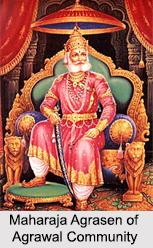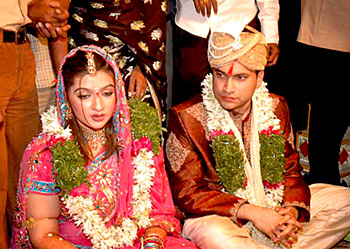Introduction
 Agrawal Community who belong to the large Vaishya community, are found in almost every part of the country. They are also known as "Banias" because of their occupation. Agrawals are among the most influential and prosperous communities and contribute a large account to world economy in terms of Business.
Agrawal Community who belong to the large Vaishya community, are found in almost every part of the country. They are also known as "Banias" because of their occupation. Agrawals are among the most influential and prosperous communities and contribute a large account to world economy in terms of Business.
The term "Vaishya" is very comprehensive and covers several business communities such as the Agrawal, Maheshwari, Khandelwal, Oswal, Jaiswal, Poswal, Dasse and Mahajan. Of these, the Agrawal is by far the largest community. Hisar became a major center of the Agrawal community.
Etymology of Agrawal Community
The name Agrawal or Agarwal is derived from the Agragan state said to be founded by Maharaja Agrasen some 5000 years ago. The word "Agrawal" literally means the "children of Agrasen" or the "people of Agroha", a city in ancient Kuru Panchala, near Hisar in Haryana region said to be founded by Agrasen.
History of Agrawal Community
In ancient times, Agragan was one of the numerous states or janapadas which were like the city states of Greece. The Mahabharata and the Buddhist and the Jain literature are the chief sources of information about them. The state comprised Fatehpur, Sikar, Jhunjhunu, Nawalgarh, portions of Rajasthan in the west, Mahendragarh and the Hisar districts of Haryana in the south, some areas of Punjab in the north and the territory as far as Agra in the east. Agroha, which is now in ruins and forms part of the Hissar district of Haryana, was its capital.
The texts and legends of the Agrawal community trace the origin of Agrawals to the legendary King Agrasena of the Solar Dynasty who adopted Vanika dharma. Maharaja Agrasen is said to have lived up to the age of 193 and ruled for more than a hundred years. With the foreign invasions in India began the downfall and disintegration of the state. Agroha was devastated during Muhammad Shahabuddin Ghori`s invasion in 1194 and it resulted in the flight of the Agrawals and their dispersal in the neighbouring areas of Haryana, Rajasthan and Uttar Pradesh.
Society and Religion of Agrawal Community
Most Agrawals follow Hinduism, although some are Jains. Agrasen attached great importance to family life and instituted 18 gotras and restricted people of the same gotra from inter-marrying, a custom which prevails even today. These gotras were derived from 18 leading families of Agrohas.
 Agrasen attached great importance to family life and instituted 18 gotras and restricted people of the same gotra from intermarrying, a custom which prevails even today. These gotras were not derived from Agrasen`s eighteen sons, as is commonly believed by the Agrawals. Rather these were derived from 18 leading families of Agrohas which were selected for this purpose by him.
Agrasen attached great importance to family life and instituted 18 gotras and restricted people of the same gotra from intermarrying, a custom which prevails even today. These gotras were not derived from Agrasen`s eighteen sons, as is commonly believed by the Agrawals. Rather these were derived from 18 leading families of Agrohas which were selected for this purpose by him.
The majority of Agrawals are Hindus but quite a number of them have embraced Jainism. This difference in religious affiliation does not constitute a barrier to marriage between these two religionists. An appellation popularly used as a surname by members of the Vaishya community, particularly the Agrawals, is Gupta. Gupt, means profound or deep. A synonym very often used for the community is `Bania`, derived from the word vanik, meaning a trader or a shopkeeper.
The Agrawals are orthodox and tradition bound. They visit Haridwar with their families for the ritual bath in the Ganga and do not normally miss such religious fairs as the Kumbh, the solar eclipse fait at Kurukshetra and the annual gathering at Garhmuk-teshwar. Those who succeed in completing the pilgrimage to the four religious centres {dhams) of Hinduism-Kedarnath, Sringeri, Puri and Dwarka-regard themselves as very fortunate.
The younger generation seems not to share the enthusiasm of their elders for religious and spiritual activities.
The Agrawal appears to combine in himself the materialism of the West with the religiousness of the East.
Social customs and practices among them are basically the same as those of other Hindus but the details vary from state to state. For instance, the rites and rituals of the Marwari Agrawals of Rajasthan are slightly different from those prevailing elsewhere.
For the Agrawal marriage is an occasion for great extravagance. Many families ruin themselves in the matter of dowry, an evil the community is particularly plagued with.
Though economical and rather miserly in personal affairs, they give away thousands in charity and often make generous donations and contributions for religious organisations and educational and charitable institutions.
Profession of Agrawal Community
By and large being businessmen and traders, the Agrawals enjoy a fair share of representation in several other professions as well. If the community has produced numerous renowned businessmen and industrialists like the Dalmias, Modis, Singhanias, Srirams and Bajajs, it has also produced a number of distinguished jurists, educationists, scientists, engineers, politicians, doctors, philosophers, poets and scholars.
Until two or three decades before the partition of India, the majority of Agrawals lived in the villages of Haryana, Delhi and a number of the adjoining districts of Uttar Pradesh and Rajasthan. This part is now generally referred to as Vishal Haryana. They carried on flourishing business there and exercised complete economic domination over the life of the other communities, particularly the agricultural. They were the bankers and the moneylenders and were perhaps the most respected and even feared people. But there has been a widespread feeling that the Banias exploited the ignorance and illiteracy of the villagers. Their critics charge them with irregularities and excesses in the maintenance of accounts and realization of debts and loans.
Although most of the `mandis` and business centres in cities and towns of the northern states like Haryana, Rajasthan, Uttar Pradesh and Delhi are the real strongholds of the community today, Agrawals can be found in almost every state, particularly in Madhya Pradesh, Maharashtra, Orissa, Assam and West Bengal.
By and large being businessmen and traders, the Agrawals enjoy a fair share of representation in several other professions as well. If the community has produced numerous renowned businessmen and industrialists like the Dalmias, Modis, Singhanias, Srirams and Bajajs, it has also produced a number of distinguished jurists, educationists, scientists, engineers, politicians, doctors, philosophers, poets and scholars.
Being engaged in one of the most lucrative professions, the Agrawals are generally looked upon as affluent class. But except for a small percentage of rich businessmen and industrialists and some others, the hard core of the community consists of ordinary shopkeepers and tradesmen.
The Marwari Agrawals of Rajasthan excel the rest in business acumen. They have done particularly well in Assam and West Bengal where some have built huge industrial empires.
It is a virile, dynamic community, full of life, drive and initiative that rejoices during the various social, religious and national functions and festivals with great zest.




















